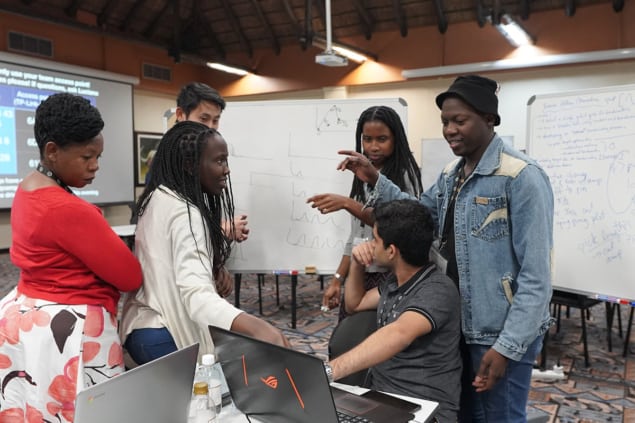Farai Mazhandu and Mhlambululi Mafu argue that quantum technologies can help propel the continent into a new era

Africa is on the brink of a quantum transformation. With a young, digitally native population and a burgeoning quantum workforce, the continent is poised to take advantage of the coming “second quantum revolution”. We cannot afford to miss out. After all, annual global investment in quantum computing has now already surpassed $30bn and is expected to reach $450–850bn in the next 15 to 30 years.
Africa is making steady progress towards such goals with countries across the continent running careers initiatives to build a quantum-ready workforce, such as OneQuantum Africa, QWorld and Quantum Leap Africa (QLA). There have also been dedicated quantum sessions at annual events such as the Center for High Performance Computing Conference in South Africa, the National University of Science and Technology Emerging Technology Symposium in Zimbabwe, and the Quantum Morocco Conference sponsored by NATO.
Scientific output by African researchers in quantum-related fields has also increased, especially over the past decade. In 2011, for example, researchers based in South Africa published about 50 articles in the field – but the annual total stands at about 200 today.
Many activities in Africa focus on quantum computing. The Kwame Nkrumah University of Science and Technology in Ghana, for example, recently held a workshop on the topic supported by IBM. Then there’s Quantum Quest – a five-week online training course on the basics of quantum computing. Run by the QLA, the African Institute for Mathematical Sciences, the University of Amsterdam and QuSoft, it’s helping to educate the next generation of quantum pioneers.
The South African Quantum Technology Initiative, meanwhile, is collaborating with companies and institutions – including IBM, the Abdus Salam International Centre for Theoretical Physics and the CERN particle-physics lab – to foster a quantum industry in the country. Platforms like IBM-Q cloud quantum computers, managed by Wits University in Johannesburg, South Africa, have given a much-needed impetus to the community. IBM and other industry giants such as Google, Microsoft, NVIDIA, D-Wave and Amazon are also providing researchers with access to quantum simulation and hardware tools.
Talent pool
Despite these positive examples, there is still much more that must be done to boost Africa’s capability in quantum technology. But we feel it will be worth the effort as such work could help Africa overcome the many challenges it faces and build a sustainable future. This is vital given that around 600 million Africans lack access to electricity, which stifles economic growth, education and healthcare.
Quantum computing, for example, could transform ammonia production by helping to discover more efficient catalysts, which is a cornerstone of fertilizer manufacturing. Reducing energy consumption and food production costs can boost competitiveness and enhance agricultural processes that lead to improved food production. Such advances could help to eradicate poverty and hunger while at the same time providing affordable and clean energy.
As well as having a great untapped talent pool of people, Africa also has abundant natural resources, notably rare-earth elements that have been discovered in the continent and will be critical for quantum technologies. The rare-earth elements in Madagascar, South Africa, Burundi, the Democratic Republic of the Congo and Namibia will be crucial to produce quantum hardware and underscore Africa’s potential to significantly influence developments in quantum computing. Sharing intellectual property and developing collaborative frameworks will help to broaden economic and social goals and reduce inequalities.
A thrilling narrative
Africa’s quantum journey, underpinned by collaborative platforms such as the Africa Quantum Consortium, is about making quantum technology relevant and boosting collaboration across the continent. There is huge potential – not just in quantum computing but also in quantum communication, simulation, metrology and sensing.
Through technology transfer, independent scientific capability and good education, we believe Africa can create partnerships that will spawn an entire quantum start-up ecosystem. It will enhance innovation and infrastructure as well as improve Africa’s economic growth through a knowledge- and digital-driven economy.
![]()
Why error correction is quantum computing’s defining challenge
Learning from the leaders in quantum technologies, such as China, Europe, Singapore and the US, will be vital. Practical quantum computing is still a long way off, but Africa’s quantum future is a beacon of hope, promising to propel the continent into an era of innovation and prosperity. We believe Africa can reach the forefront of knowledge in quantum technologies while at the same time solving some of its great challenges.
It will be easier said than done but through planning, collaboration with the international community, and an unwavering commitment to education and workforce development, we are confident that Africa can contribute to the global quantum revolution. It will, we are sure, be a key player in shaping the future of science, technology and innovation in the continent and beyond.
- SEO Powered Content & PR Distribution. Get Amplified Today.
- PlatoData.Network Vertical Generative Ai. Empower Yourself. Access Here.
- PlatoAiStream. Web3 Intelligence. Knowledge Amplified. Access Here.
- PlatoESG. Carbon, CleanTech, Energy, Environment, Solar, Waste Management. Access Here.
- PlatoHealth. Biotech and Clinical Trials Intelligence. Access Here.
- Source: https://physicsworld.com/a/africas-quantum-future-offers-a-beacon-of-hope/



